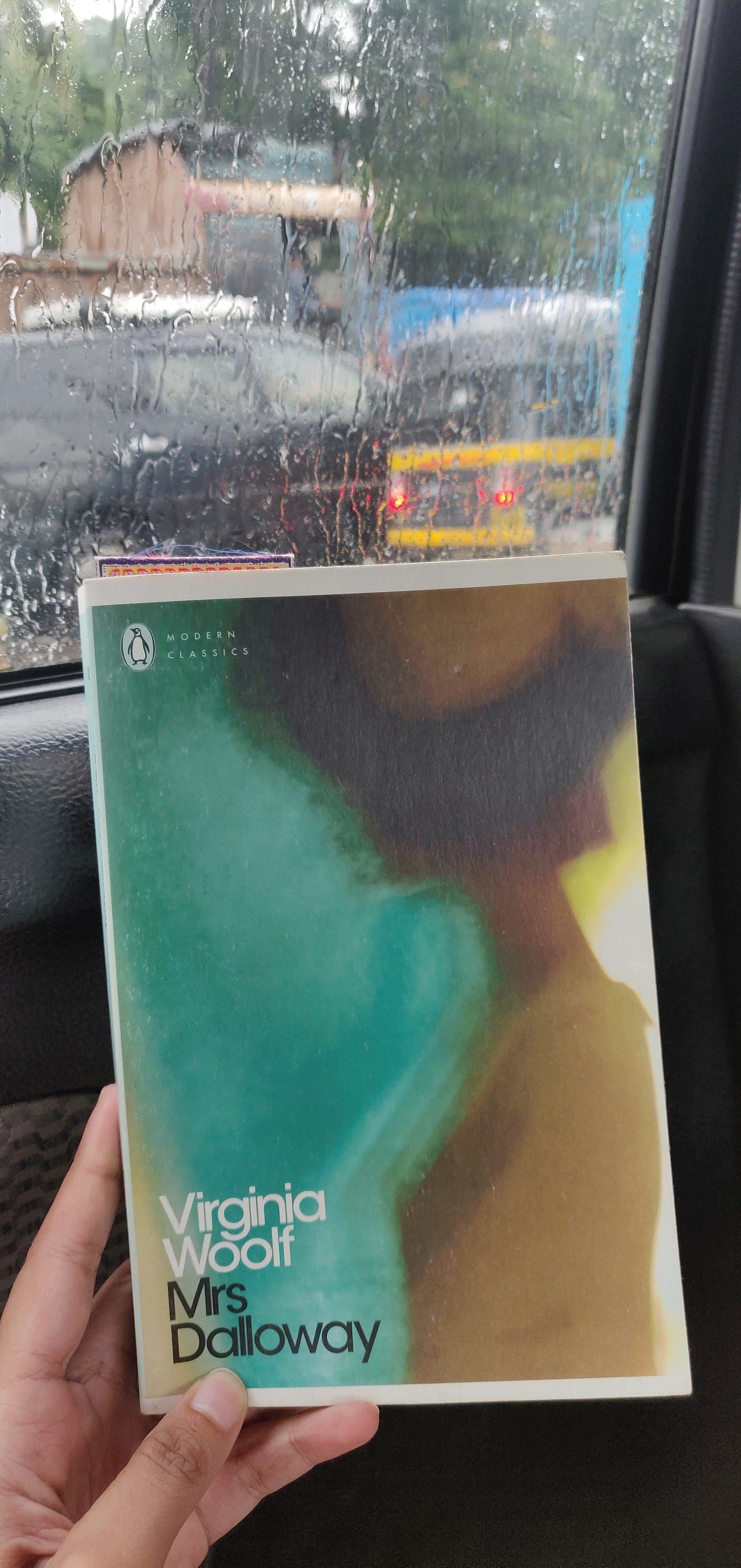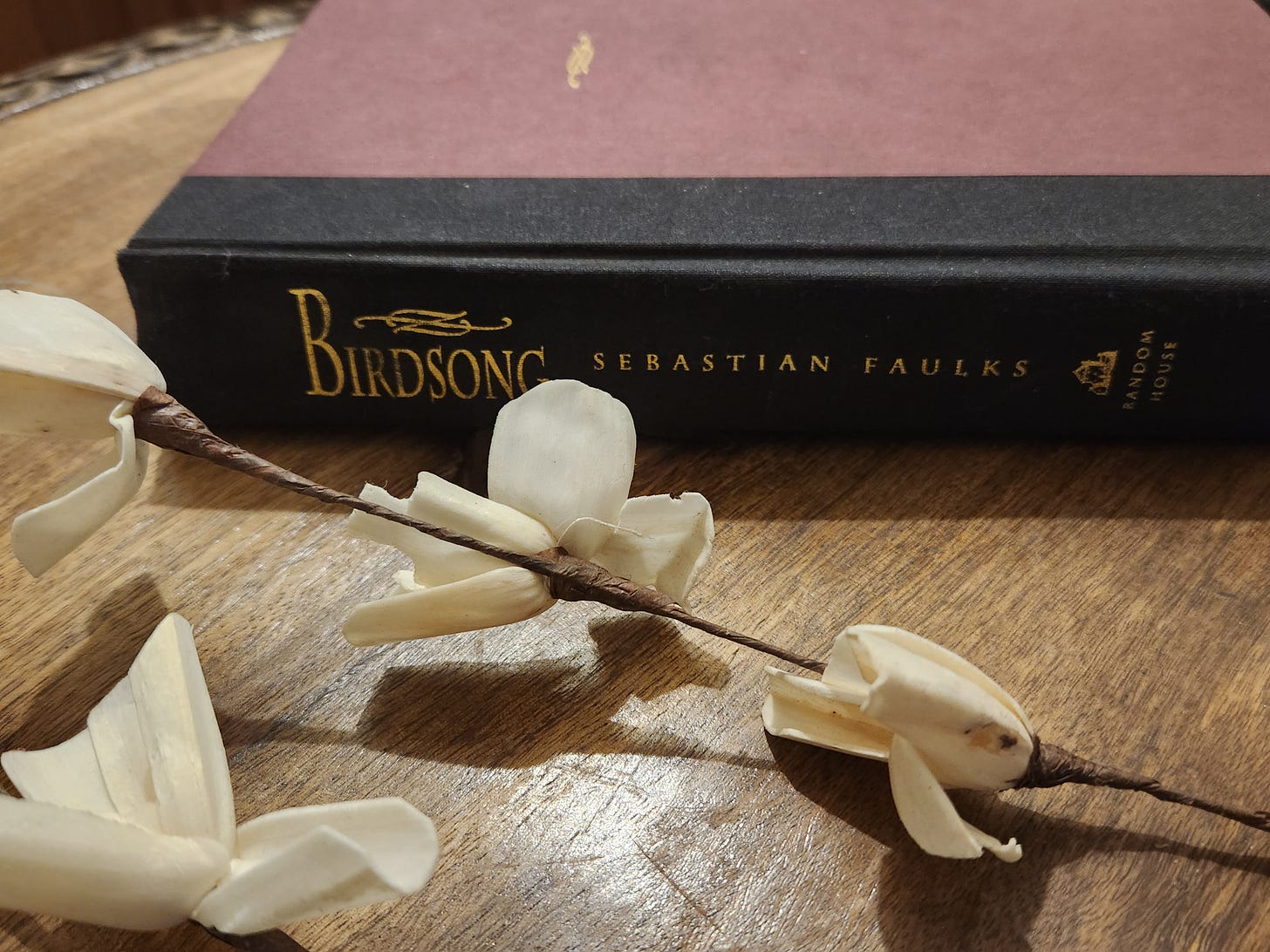Hello, hello. Turns out I have more book reviews written by my past self that have not found a space here. Also turns out they look at a place I have not visited and a time I have not inhabited but speak to me in a familiar language- of loneliness despite abundance, of the search for the meaning of life and of wonder regardless of all else.
Modernism, stream of consciousness prose, feminism- these may be ideas familiar to those interested in literary studies but to the idle reader they mean little, bother even less, as long as the end product is to their liking. Mrs Dalloway by Virginia Woolf is one of those classics that ticks these boxes but doesn’t make for an easy read (it took me two).
The metaphors aren’t easy to grasp but the poetry in her fiction casts a spell- “First a warning musical. Then the hour irrevocable. The leaden circles dissolved in the air.” I reread this part multiple times, then looked it up all across the internet to understand the intended meaning. The manner in which some such phrases are repeated throughout the text lends mystery to the writing. Her style- including going back and forth in time, sliding from the mind of one character to the next, takes time to get used to. Once you do though, the book feels like a series of snapshots taken over the city of London which capture the mind and the soul of the hostess (Mrs Dalloway), her politician husband, her ex lover, her daughter, her teacher, an ex-soldier, his wife and many such people.
Woolf however isn’t trying to throw these many characters at us for us to judge them, we know them for very little time to make an informed judgement- but we see them and empathise with them, because we know their most trivial thoughts.
I wanted to like Clarissa Dalloway from the first line itself- “Mrs Dalloway said she would buy the flowers herself”. For a high class woman in the 1920s, I realised as I was coming out from seeing a lot of Downton Abbey, it is an assertion of identity. I admired her for marrying the dependable Dalloway over the volatile Walsh. It wasn’t romantic, but it was smart, rooted in some kind of surety of what she wants from life, knowledge of herself and her potential- which is more real than romance can ever be.
Yet Mrs Dalloway never thinks highly of herself- “she sliced like a knife through everything, at the same time was outside, looking on.” Thankfully, the others have a better opinion of her, even if they might find it difficult to come to terms with it. We see her best through the eyes of Peter Walsh whose being itself is affected by her presence, and he can only say ‘there she was’.
After finishing the book I saw The Hours, the 2002 Academy award winning movie based on a book of the same name 1. It stars Nicole Kidman, Julianne Moore and Meryl Streep as three women in three different time frames whose lives are interconnected by Mrs Dalloway. In the 1920s England Virginia Woolf is writing Mrs Dalloway while struggling with depression, in the 1950s a housewife in the US is reading this book and dealing with an unhappy marriage and in 2001 a woman named Clarissa is hosting a party for her ex-lover and buying herself flowers. Some books are timeless for a reason.
When I read Virginia Woolf’s Mrs Dalloway, the character Septimus Smith intrigued me. He had suffered shell-shock, the then prevalent term in England for post-traumatic stress disorder experienced by the veterans of World War I. Along with Woolf’s attempt to give agency to the women of that era, to have them buy their own flowers, there was an equally sympathetic take on the war torn masculinity. What had World War I done to a full generation of men? What had they seen, felt, lived and why was it important to not forget?
Sebastian Faulks’s Birdsong provides answers to some of that. It is decidedly an attempt to ensure that the war is not wiped off the collective memory of the future generations through the quest of the granddaughter of a veteran to redeem his legacy. But that is the weaker part, the book is at its best, when it is itself- an epic.
Birdsong is the story of Stephen Wraysford, a young Englishman who arrives in a small town in northern France for work, but falls in a passionate love affair with the wife of the man who houses him. In a few years, like the rest of his generation, he finds himself in the thick of the Great War, leading battles (like the Battle of Somme), through dug tunnels and trenches, amidst fear of shells landing and mines blasting.
The war is at the heart of the story, but the glorification of war isn’t. The fragility of the human body is displayed with uncomfortable proximity- tattered bodies, missing limbs, humans that become particles blowing in the air. Sometimes with death there is relief since the pain of life is unbearable. Through this, the men survive, day after day for years. None of their original company remains, they scratch their bodies because of lice without even realizing, find solace in superstition because none of reality makes sense. Some find refuge in friendship, but even that is a slippery slope, because they might have to step over the body of a friend. Very few survive, but in a way, they had all died.
‘His life became grey and thin, like a light that might at any moment be extinguished; it was filled with quietness.’
How is the world outside viewing the war? Is there even a front page story in the newspaper or does the excitement of war eventually turn into indifference? And a few generations later, does it get wiped out of collective consciousness? Stephen’s granddaughter Elizabeth, in a parallel arc in England, tries to make her family’s legacy while struggling with the end of her own.
Faulks manages to take us into the uncomfortable, unkempt dugouts of the soldiers, their confused minds, their guilt, their rage, their need to take bloodthirsty revenge, their indifference. From there we know what we should have known all along- the futility of war and the redemptive power of love.
When I had picked up this first edition 1973 hardback from a by-the-kilo sale I had an inkling I had chanced upon a masterpiece. I had. It perhaps is objectively one of the greatest war novels, doing justice to the cause of remembrance and presentation of trauma, without ever being unreadable. The book has multiple references to Arras, the small town in northern France, which was at the frontline in multiple battles. A few months ago I mentioned this to my cousin who lives in Arras. The city is surrounded by graveyards, she told me, and is to France what Panipat is to India.
To become synonymous with war must be draining, I wonder, to think that school children are remembering the number of graveyards and deaths against your name must take another life out of you. If it weren’t for literature.
‘I could not persuade her that a place does not merely exist, it has to be invented in one’s imagination.’
I was sold early on in Shadow Lines by Amitav Ghosh by this one line of the narrator, referring to his cousin Ila. Most of us aren’t lucky to have an uncle like Tridib in our lives, but we have books and cinema that describe faraway places, their arches and gateways, their cafes and bookshops, in such detail and with such warmth that we romanticize them, inventing a version in our imaginations before, if ever, we visit those places.

Having created some imaginary versions of cities myself, the narrator’s obsession with the streets and corners of London didn’t seem out of place to me. But the obsession with the travels was only a symptom of a deeper cause- his fascination with the space that Tridib occupied in the universe, a misfit from the high class, an effortless glider from academics to street gossip, with charms that could invite a young girl across oceans. The narrator looked at the world through Tridib-tinted glasses, hence most of what we read has Tridib’s essence, his story. No wonder the prose is so excellent.
‘Everyone lives in a story…because stories are all that there are to live in, it was just a question of which ones you choose.’
It is not possible to delve into all issues touched by the writer, because they vary from the political (nationalism, gender, religion) to the personal (love, family, idea of home) with the lines between them dividing less and interweaving more, something like an exquisite Cashmere carpet. For this is how I would imagine Amitav Ghosh as a writer here, a carpet weaver running colour through the mesh formed by the horizontal and vertical threads of time and space.
What I found masterful was the eye to look for meanings in the mundane- for instance the observation of how family photographs have changed over time. And the conclusion that stories don’t change across borders-either of land, seas or shadows.
The Hours was the working title of Mrs Dalloway






